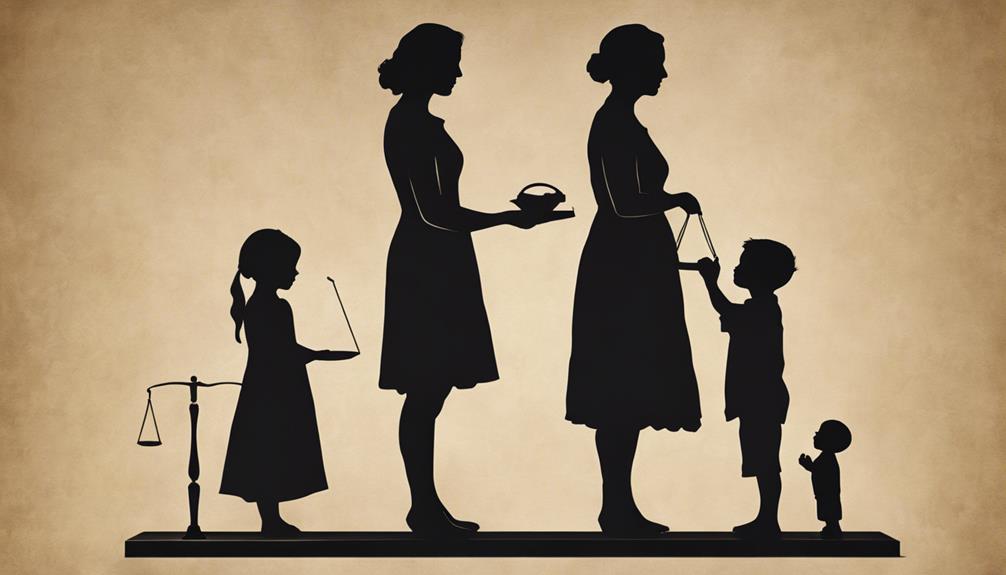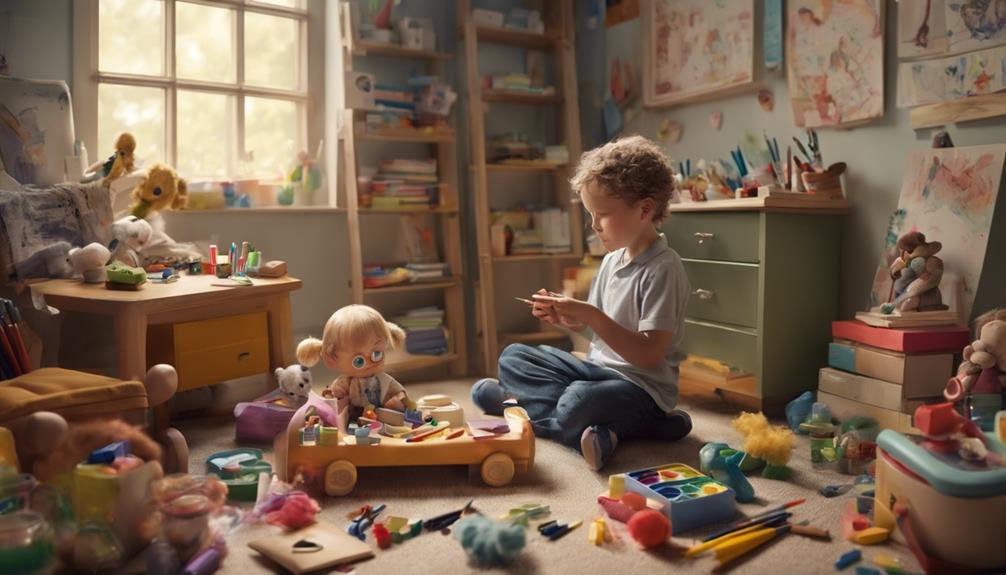Discussing child custody during a divorce can be incredibly challenging emotionally, but understanding the typical approaches to it can provide guidance and clarity.
From legal and physical custody distinctions to factors like the child's best interests, parenting plans, and mediation, there are numerous facets to explore.
Let's explore the essential aspects of child custody arrangements that can impact the well-being of minor children during and after a divorce.
Key Takeaways
- Legal and physical custody decisions crucial for children's well-being.
- Child's best interests prioritized in custody determinations.
- Courts consider various factors for custody arrangements.
- Mediation encouraged for more mutually agreeable custody agreements.
Legal Vs. Physical Custody
In understanding custody arrangements in divorce cases, it's essential to differentiate between legal custody, which involves decision-making authority, and physical custody, which determines where the child resides.
Legal custody empowers parents to make crucial decisions regarding their child's upbringing, encompassing areas such as education, healthcare, and religious upbringing. On the other hand, physical custody dictates the child's primary residence and the visitation schedules between the parents.
Legal custody can be either joint, with both parents sharing decision-making responsibilities, or sole, where only one parent holds this authority. Similarly, physical custody arrangements can be shared, allowing the child to spend substantial time with both parents, or exclusive, where the child primarily resides with one parent.
Understanding these distinctions is vital in crafting custody agreements that best serve the child's well-being and development while also considering the parents' roles and responsibilities in their child's life.
Best Interests of the Child Standard

When considering the 'Best Interests of the Child' standard, we prioritize the child's welfare above all else.
We assess the level of parental involvement, ensuring that both parents have the opportunity to maintain a meaningful relationship with their child.
Stability and consistency in the child's life are crucial factors that guide us in creating a custody arrangement that nurtures the child's overall well-being.
Child's Welfare Priority
Considering the child's well-being as the paramount concern, courts carefully evaluate various factors to determine custody arrangements in divorce cases. The best interests of the child standard guide these decisions, focusing on the child's emotional, physical, and developmental needs. Stability, continuity, and the child's relationship with each parent are pivotal considerations.
Safety, well-being, and any history of abuse or neglect play a crucial role in custody determinations. Assessing parental ability to provide a supportive and nurturing environment is essential in crafting custody arrangements that prioritize the child's welfare. By weighing these factors thoughtfully, courts aim to ensure that the child's best interests are at the forefront of custody decisions, promoting a safe and stable environment for their growth and development.
Parental Involvement Assessment
Assessing parental involvement in custody cases hinges on prioritizing the child's well-being and needs, with a focus on various factors such as the child's age, emotional ties with each parent, and the stability of the home environment.
Parental ability to provide care and support is crucial, as is the child's safety and happiness. The courts consider each parent's history of caregiving and involvement in the child's life, aiming to promote the child's physical and emotional development.
Additionally, the child's preferences, if appropriate based on age, are taken into account. Ultimately, the goal of the parental involvement assessment is to establish a custody arrangement that serves the child's best interests above all else, ensuring their overall welfare and happiness.
Stability and Consistency
To ensure the child's best interests are upheld, stability and consistency play a pivotal role in determining custody arrangements post-divorce. Courts prioritize maintaining the child's routine, relationships, and environment to promote stability.
Consistent caregiving, school attendance, and community ties are crucial factors in custody decisions, providing a sense of security. Stability in living arrangements and daily life helps minimize the impact of divorce on the child.
Child's Opinion on Custody

As parents navigate divorce proceedings, understanding their child's preference in custody arrangements becomes crucial. In some states, children as young as 12 can voice their opinions, shedding light on their emotional needs and desires.
Judges consider these preferences alongside other factors, aiming to make decisions that align with the child's best interests.
Child's Preference
Considering a child's opinion on custody is a crucial factor in divorce cases, particularly in Texas where children aged 12 or older are allowed to express their preferences to the court. When evaluating child custody preferences, courts take into account various factors, including the child's well-being, safety, and the existing custody arrangements.
While the child's input is significant, it isn't the sole determinant in custody decisions. Judges carefully consider the child's wishes, especially if they align with the child's best interests. In custody matters, the court prioritizes the child's safety and overall welfare above parental preferences, aiming to create custody arrangements that serve the child's needs first and foremost.
The child's voice holds weight in court considerations, ensuring their perspective is heard and valued.
Legal Considerations
When evaluating custody arrangements in Texas, the child's opinion becomes a significant factor if they're 12 years or older. Understanding the child's perspective is vital in making decisions that align with their best interests.
Here are some key considerations regarding the child's opinion on custody:
- Child's Preference: The child's wishes are taken into account when determining custody arrangements.
- Court Interview: Courts may conduct private interviews with the child to better understand their feelings and preferences.
- Weight of Opinion: The weight given to the child's opinion depends on factors such as their age and maturity level, all with the goal of ensuring the custody decision is in the child's best interests.
Parenting Plans for Custody

Crafting a parenting plan that outlines custody arrangements, visitation schedules, and decision-making authority is a crucial step in ensuring the well-being of the child during and after a divorce. These plans play a vital role in determining how parents will share responsibilities and make important decisions for their child.
Tailored to each family's specific circumstances, parenting plans are flexible documents that can be adjusted as needed. Courts typically require parents to submit these plans for approval to guarantee the child's best interests are prioritized.
Child Custody and Support

As parents navigate the complexities of divorce, the determination of child custody and support becomes a pivotal aspect in safeguarding the well-being and future of their children. When addressing child custody and support, it's crucial to consider various factors to ensure the best interests of the child are met:
- Child Custody: The type of custody arrangement – whether sole, joint, split, or third-person – must prioritize the child's well-being and stability.
- Child Support: Financial assistance provided by one parent to the other is essential for meeting the child's needs and ensuring their welfare.
- Court Orders and Parenting Plans: Courts may intervene to establish a parenting plan outlining custody arrangements and responsibilities to ensure clarity and consistency for all parties involved.
Role of Mediation in Custody

Utilizing mediation as a tool in custody disputes offers a constructive and collaborative approach to resolving conflicts outside of the courtroom setting. In Texas, where mediation is often a required step in custody cases, trained mediators play a crucial role in facilitating discussions between parents to create a comprehensive parenting plan. This process not only tends to be more cost-effective than going to court but also fosters a less adversarial environment, ultimately leading to more mutually agreeable custody arrangements.
One of the key aspects of mediation is its focus on promoting effective co-parenting and prioritizing the best interests of the child involved. By encouraging parents to communicate openly and work together to find solutions, mediation can help establish custody arrangements that take into account the unique needs and circumstances of the child. This collaborative approach not only empowers parents to have a say in the final decisions but also sets a positive foundation for future co-parenting dynamics.
Determining Custody in Contested Divorce

When determining custody in contested divorces, the court carefully evaluates various factors to ensure the well-being of the child is prioritized.
- Parental Fitness: The court assesses each parent's ability to provide a safe and nurturing environment for the child.
- Child's Best Interests: Decisions are based on what'll benefit the child the most, considering their emotional, physical, and psychological needs.
- Stability: The court looks at the stability each parent can offer the child in terms of residence, school consistency, and continuity of relationships.
In contested divorces, legal representation is crucial as it helps in presenting your case effectively. Providing substantial evidence to support your position is essential in influencing the custody determination. The court may order evaluations or interviews to gain a better understanding of each parent's parenting capabilities. Ultimately, the court aims to create a child custody arrangement that serves the child's best interests and promotes their overall well-being.
Modifying Custody Arrangements

When it comes to modifying custody arrangements, courts typically require evidence of a significant change in circumstances before approving any adjustments.
Our main focus remains on the child's best interests throughout this process, ensuring their well-being is prioritized.
Whether it's a child's preference, a parent's relocation, or mutual parental agreement, modifications must align with what's best for the child.
Court Approval Required
In seeking court approval to modify custody arrangements post-divorce, a significant change in circumstances impacting the child's well-being is a crucial factor to consider. When navigating this process, it's essential to prioritize the child's best interests and stability. Here are key points to keep in mind:
- Demonstrate a Substantial Change: Clearly outline how the proposed modification addresses a significant shift in circumstances affecting the child's well-being.
- Consider Various Factors: Changes in a parent's living situation, employment status, or health should be thoroughly evaluated in relation to the child's welfare.
- Seek Legal Guidance: Consulting with legal professionals ensures that any modifications align with the law and are in compliance with the court's requirements.
Approaching custody modifications with care and diligence is paramount for all parties involved.
Parental Agreement Needed
To modify custody arrangements in divorce cases, obtaining a parental agreement is typically a necessary step. When seeking modifications, both parents must either reach mutual consent or obtain court approval. It's crucial that any changes to custody arrangements prioritize the child's best interests. If parents cannot agree on modifications, court involvement may be necessary to make decisions that serve the child's welfare. Meeting legal requirements is essential when altering custody agreements. Below is a table summarizing key points related to the need for a parental agreement in modifying custody arrangements:
| Key Points | Details |
|---|---|
| Custody Agreement | Parental agreement needed |
| Modifications | Require mutual consent or court approval |
| Child's Best Interests | Changes must prioritize child's welfare |
| Court Involvement | Necessary if parents can't agree on modifications |
Requirements for Custody Order Modification

Upon seeking a modification to a custody order, a substantial change in circumstances impacting the child's well-being and best interests is a fundamental requirement. When considering a custody order modification, it's crucial to understand the following:
- Factors for Modification: Courts take into account various factors like parental relocation, safety concerns, or the child's own preferences when evaluating a request for modification.
- Proof of Changes: Providing evidence of significant changes such as a parent's remarriage, job loss, or health issues can strengthen the case for a custody order modification.
- Evaluation of Well-being: The court assesses modification requests with a focus on the child's overall well-being and the stability they'll have in the new circumstances. This includes adjustments to visitation schedules, decision-making authority, and custody arrangements to ensure the child's best interests are met.
Navigating the process of custody order modification requires sensitivity to the child's needs and a thorough understanding of the legal requirements to ensure a smooth transition for all parties involved.
Types of Custody Arrangements

What are the different types of custody arrangements available in divorce cases involving minor children? When determining custody arrangements, the court considers the child's best interests. Here are the common types of custody arrangements:
| Type of Custody | Description | Example |
|---|---|---|
| Sole Custody | One parent has exclusive legal and physical custody rights over the child. | The child lives with and is cared for by one parent. |
| Joint Custody | Both parents share legal and/or physical custody responsibilities. | Parents collaborate on decision-making and parenting time. |
| Split Custody | Siblings are divided between parents based on their best interests. | Each parent has primary custody of at least one child. |
| Third-Person Custody | A non-parent, like a grandparent, is awarded custody in specific circumstances. | Grandparents are granted custody due to parental incapacity. |
Understanding these custody arrangements can help divorcing parents navigate the complexities of legal and physical custody for their minor children.
Frequently Asked Questions
What Custody Arrangement Is Best for a Child?
For a child, the best custody arrangement prioritizes safety, well-being, and emotional needs. Factors like age, relationships, and stability are vital. Research supports meaningful relationships with both parents if it benefits the child.
What Is the Biggest Mistake in Custody Battle?
Focusing on winning rather than the child's well-being is a grave error in custody battles. Engaging in alienation or conflict harms your case. Disregarding court orders or lacking legal advice leads to costly mistakes. Prioritize the child.
What Is the Most Common Arrangement for Children Following Divorce?
We find that joint custody, where both parents share legal and physical responsibility, is the most common arrangement after divorce. This allows both of us to be involved in major decisions and daily care of our child.
What Is an Example of Failure to Co Parent?
When we don't communicate effectively about our child's needs or well-being, fail to make joint decisions, or undermine each other's authority, we demonstrate a failure to co-parent. Cooperation and respect are key.
How Can Custody of Minor Children Be Resolved During a Divorce in Kentucky?
When parents get a divorce in Kentucky, complete custody of minor children is typically resolved through a parenting plan, which outlines physical and legal custody arrangements. In some cases, mediation or court intervention may be necessary to determine the best interests of the children.
Conclusion
In the complex and emotional landscape of divorce, navigating child custody arrangements can be overwhelming.
It's crucial to prioritize the well-being of the children involved and seek guidance from legal professionals to ensure the best outcomes.
Remember, at the heart of every custody decision is the welfare of the child, and taking proactive steps to create a stable and nurturing environment is key to moving forward with grace and compassion.











